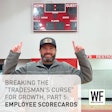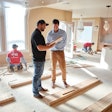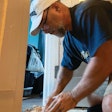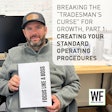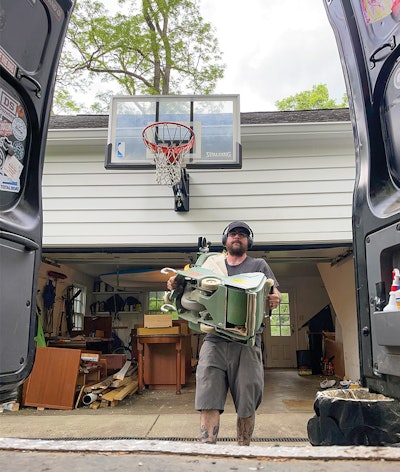
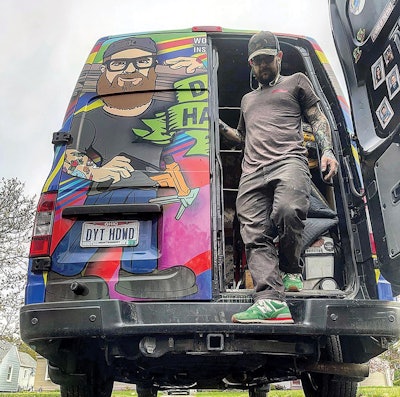 I worried about the perception of a one-man business, but after I did it, I realized that what I was viewing as weaknesses were actually strengths.
I worried about the perception of a one-man business, but after I did it, I realized that what I was viewing as weaknesses were actually strengths.
I own Dayton Hardwood Co. based (currently) out of Dayton, Ohio. My job title is what I like to refer to as "owner/operator," meaning I own the business and run all the day-to-day operations personally. Basically what that means is that I do every job that is necessary to run the business on a daily basis. I do have a lovely wife who helps me with the accounting and keeps me from spending all of our money, but everything else is on me—and I'm going to tell you why that's the best way to do things for a business like mine.
Years ago when I was starting Cheadle Construction, my first iteration of the current business where I used to do full-scale remodeling, the idea was pushed to me by successful contractors, business owners and wealthy people that there is a need for constant business growth. And not only do you need to be growing physically, i.e., more employees, more equipment, a brick-and-mortar shop, but also you need to be constantly growing in profitability every single year. This sounds great, right? Well, not if you got into the profession for your love of the art and not for the worship of the dollar. For some reason, it took me several years to figure this out.
At one point three employees and I were doing the labor portion of the jobs. Two of them were full-time, and the other was more on a subcontractor basis. There were times when things would go smoothly, but more often than not, it seemed like the majority of my day was spent putting out proverbial fires that these guys had started: I was scrubbing clients' toilets, vacuuming various parts of the house we weren't even working in, repairing holes in walls from equipment, apologizing to parents for the obscene language their children heard my guys saying, etc., etc. While these sound like menial things that aren't that big of a deal, I have three small children at home, and I'm not wanting to play dad on the job, too! I found myself spending too much time and energy on these management efforts and not enough time getting my hands dirty doing the work I love—the work that brought me there in the first place.
RELATED: Stop the Excuses and Take Responsibility For Your Wood Floor Business
I think this is where I met a real crossroads, and it's probably a spot a lot of you have either been in before or are finding yourselves in right at this very moment. Do I want to continue down a path of growth, ultimately ending up off of the job site and in an office wearing a polo shirt and making deals on the phone while a bunch of folks are out doing the labor? Or do I want to send these goons packing so I can put my headphones on, crank up the punk rock, and do this stuff the way I wanted done in the first place?!
I chose the second option. It was at this point I also realized I didn't like doing full-scale remodeling projects anymore (but that's an entirely different story in itself). In a nutshell, though, I was getting really busy and found myself scheduling these kitchen/bath remodels (that I didn't want to do) and turning down the floor refinishes (that I DID want to do), so that's when I switched company names and found my niche, too.
It took several months, if not a couple years, to settle into this new position and role in the company. I had a lot of mental insecurities around this new setup for a lot of different reasons. From the clients' perspective, I was worried they might think, "How can he do that amount of work alone?" or, "This is going take a lot longer than if a whole crew showed up," but slowly I realized what I was viewing as weaknesses were actually strengths. And like anything in life, it comes down to your perspective on things. I began to realize I am very efficient and find creative ways of getting things done safely and quickly by myself. Machine transport, for instance. Contractors always ask, "How do you haul all the equipment in and out alone?" First of all, I really enjoy hard work and lifting heavy shit, so let's get that understood, haha. I take all my big machine and planetary machines apart into multiple pieces to carry them in and out. Does that sound like a waste of time and effort to you? Not to me! It's a solid opportunity to thoroughly clean, adjust and inspect each machine. This forces me to be a good machine mechanic, too.
To ease the clients' concerns, I just let the work speak for itself. As you know, the first pass from a big machine really opens people's eyes, especially with a gnarly refinish scenario. So once all my stuff is in the house, set up, plugged in and tested, I'm ready to rock. (Also, this is when the real noise starts, so they usually make themselves scarce at this time!) It only takes about 30 minutes with a 220-volt belt sander to separate the pros from the novices, and even though clients don't always know what they're looking at, they can tell a major change is underway. And I think at this point their concerns start to melt away a bit. After doing this process enough times, I learned the things I was insecure about and maybe even a little ashamed of are my strengths and points of pride.
I have the ability to make a badass wood floor from the ground up, alone, with my own two hands. And so do you. If you're feeling like you might be that wood floor lone gun like me, I'm here as living proof that you can do it. Even in 2021, there are still people living the American dream, and it can be your version of that dream—not someone else's.
RELATED: How We Stopped Working Late Nights and Weekends























